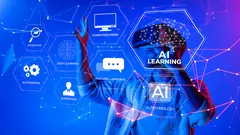239
2
4 minutes
Suggested Articles

AI Takes On Game Cheaters, Transforming Fair Play in Competitive Gaming
Discover how AI is transforming video game cheat detection and moderation, exploring advanced technologies, real-world results, and the future of fair play.

How AI and Micro-Credentials Are Reshaping Future Careers in Tech
AI & Everyday Tech

Generalist AI is revolutionizing daily life and powering a new tech era
AI & Everyday Tech

AI Is Revolutionizing Creative Careers—Here’s How Americans Are Thriving
AI & Everyday Tech

Generative AI Is Quietly Transforming Workflow Automation Across America
AI & Everyday Tech

AI Spell Checkers Are Quietly Revolutionizing How We Write Every Day
AI & Everyday Tech

AI coding assistants like Copilot and ChatGPT are transforming developer workflows
AI & Everyday Tech

Digital health advocates face harsh truths as AI therapy chatbots falter
AI & Everyday Tech

Unlock Your Productivity and Privacy With a Local AI Assistant on Your PC
AI & Everyday Tech

OpenAI’s ChatGPT transforms homework with interactive AI learning mode
AI & Everyday Tech

Playing video games together strengthens relationships and sparks real connection
AI & Everyday Tech

US crypto pioneers transform bold risk into life-changing fortunes
AI & Everyday Tech

Tech leaders embrace waste-to-carbon solutions as Microsoft bets big on green AI
AI & Everyday Tech

Travelers and campers embrace portable backpack laundry tech for freedom and clean clothes anywhere
Gadgets & Reviews

Sleep experts champion a smart anti-snoring belt for restful nights and healthier mornings
Gadgets & Reviews

Drivers use Google Maps and Waze to avoid fines but risk safety trade-offs
AI & Everyday Tech

App lovers seize this week’s best free premium downloads before time runs out
Smartphones & Apps
 W3 CodeCraft
W3 CodeCraft

Comments